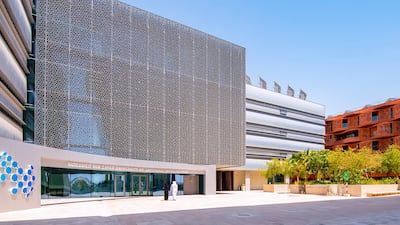The Global Carbon Capture and Storage (CCS) Institute, an international think tank focused on carbon capture and storage technology, opened its first Middle East headquarters in Masdar City.
With the opening of the office, Global CCS Institute has joined other institutions and companies at Masdar City including the International Renewable Energy Agency (Irena) and Siemens Energy, Masdar City said in a statement on Tuesday.
Masdar City also hosts Mohammed bin Zayed University for Artificial Intelligence, Emirates Nuclear Energy Company and US company Honeywell, among others.
The Emirates plans to cut emissions and become carbon neutral in the next three decades in line with the UAE Net Zero 2050 Strategic Initiative, making the Emirates the first Middle East and North Africa nation to do so. The UAE began financing clean energy projects more than 15 years ago and has invested more than $40 billion in the sector to date.
“As the first country in the region to deploy CCUS (carbon capture utilisation and storage) on an industrial scale, the UAE has a proven track record of success as a leader in carbon capture, and the addition of the Global CCS Institute will only help promote CCS further,” Dr Sultan Al Jaber, Minister of Industry and Advanced Technology, UAE Special Envoy for Climate Change and Chairman of Masdar, said.
In 2016, Adnoc set up a joint venture with Abu Dhabi clean energy company Masdar to create Al Reyadah, the world's first commercial-scale CCUS project.
It involved capturing carbon dioxide, the main pollutant responsible for climate change, from Emirates Steel's plant in Mussaffah and using it to inject into wells to improve the amount of oil and gas recovered, as well as safely storing the gas underground.
“The institute’s mission to accelerate the adoption of carbon capture technologies perfectly aligns with Masdar’s role as an incubator and catalyst for innovative clean technologies. I am confident that the Global CCS Institute will thrive in this environment and continue to make a valuable contribution to global decarbonisation efforts, particularly as the UAE prepares to host Cop28 in 2023,” Dr Al Jaber, said.
Carbon capture and storage is an innovative technology that mitigates climate change impacts by capturing carbon dioxide, typically from a point source at an industrial facility and storing it beneath the earth’s surface before it can impact the atmosphere.
There are currently three CCS units in the GCC region, which account for 10 per cent of the world’s carbon dioxide captured by the technology every year, according to Masdar City.
“Carbon capture technologies are a critical tool for the global response to climate change and there is increasing awareness that widespread adoption will be essential to meet the goals of the Paris Agreement,” Dr Al Jaber, said, while adding hosting the Mena headquarters of the Global Carbon Capture and Storage Institute at Masdar City “underlines Masdar and the UAE’s commitment to practical solutions to climate challenges”.
The UAE became the first country in the Middle East and North Africa region last year to adopt a strategy to achieve net-zero carbon emissions by 2050. As part of its net-zero strategy, the UAE plans to invest Dh600bn ($163.37bn) in clean and renewable energy projects over the next three decades.
The Arab world’s second-largest economy is building the world’s largest solar plant in the Al Dhafra region of Abu Dhabi, with a total capacity of two gigawatts, and the five-gigawatt Mohammed bin Rashid Solar Park in Dubai.
“Following years of ambition, CCS opportunities are being realised in the Gulf Co-operation Council states and the progress so far is promising,” Global CCS Institute's chief executive Jarad Daniels, said. “The region is well positioned to become a leader, both in the CCS market and the energy transition more broadly.”
Masdar City is also set to host a new development that will include the capital's first net-zero office building, it announced earlier this year.


